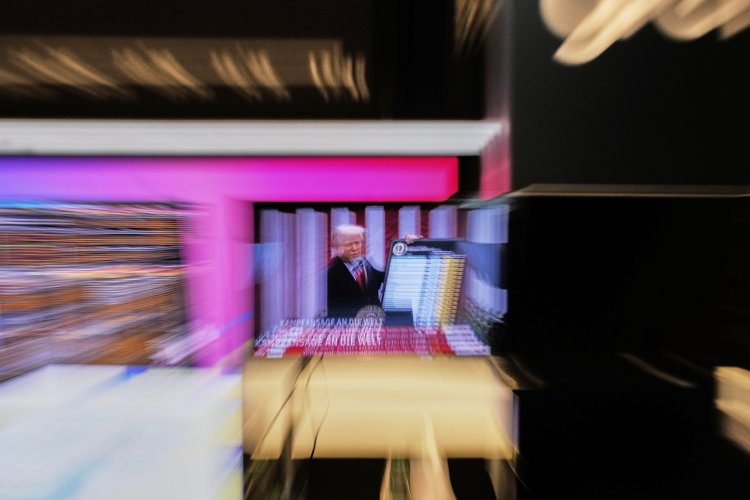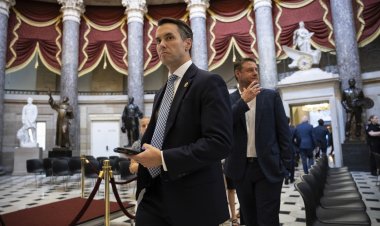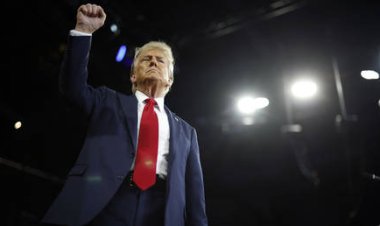US markets plummeted; Americans already questioned Trump's tariffs before the downturn.
Recent polls indicated that Americans expressed caution regarding tariffs, even prior to the president initiating his strategy to reshape the global trade framework.

In a series of recent polls, all conducted prior to Trump's announcement—which caused market turmoil and brought the U.S. close to an international trade conflict—a majority of respondents voiced disapproval of the proposed extensive tariffs, reflecting discomfort with the president's economic management.
The global tariffs took effect on Saturday morning, with additional levies against certain trading partners designated as "bad actors" set to be activated next week.
This situation could pose a significant challenge for Trump, as he has built his political identity around economic strength. Throughout much of his first term and into the 2024 election campaign, he received generally favorable evaluations for his economic handling and frequently criticized then-President Joe Biden and Vice President Kamala Harris regarding their management of the economy.
A Wall Street Journal survey released Friday, conducted between March 27 and April 1, revealed that 54 percent of voters disapproved of Trump's tariff approach, with three-quarters expecting tariffs to lead to price increases on consumer goods. Additionally, 52 percent of respondents disapproved of the president's overall economic management, surpassing those who approved by 8 percent.
These statistics signify a notable decline from October, when a Journal survey indicated that voters viewed then-candidate Trump’s economic proposals favorably by a 10-point margin over those who opposed them.
The Trump administration has argued that the tariffs—frequently discussed by the president during his campaign and promoted as a means to rectify what he views as exploitative trading relationships—will eventually lower prices by encouraging manufacturing companies to return to the U.S.
The White House did not respond to a request for comment regarding the polling on Saturday.
Trump’s aggressive tariffs shocked global markets and left U.S. allies unsettled, with many threatening retaliatory actions. China, for example, announced a reciprocal 34 percent tariff on Friday.
U.S. markets plummeted immediately after Trump's announcement, resulting in trillions of dollars lost in market value. JPMorgan Chase chief economist Bruce Kasman warned that if Trump's tariffs remain in place, the likelihood of a global recession within the next year rises to 60 percent.
Despite this, Trump remains steadfast in his approach, stating that he “will never change” his tariff policies.
In the lead-up to the unveiling of Trump’s tariff plan, Americans expressed skepticism. According to a Marquette Law School poll released on “Liberation Day” and conducted from March 17-27, 58 percent of adults believed the tariffs would harm the U.S. economy, in contrast to only 28 percent who thought they would be beneficial, while 14 percent felt they would have no impact at all.
Respondents across nearly all demographics—encompassing race, gender, and education—tended to believe that the tariffs would hurt rather than help the economy. The only exception was among white, non-college educated men—a core segment of Trump's support—where 44 percent believed the tariffs would benefit the economy, while 40 percent thought they would be detrimental.
Survey participants also indicated a perception that Trump was overly focused on tariffs and not enough on reducing costs. A CBS News/YouGov poll released Sunday and conducted from March 27-28 indicated that 55 percent of voters felt Trump was concentrating too much on tariffs, while 64 percent believed he was not paying enough attention to reducing prices.
Democrats see this growing skepticism about Trump's tariff strategies as an opportunity to create new campaign angles as they approach the midterms. Party officials report increased interest from candidates targeting Republican districts, viewing this as a chance to make gains in traditionally GOP areas.
Democrats have also criticized Trump for taking a golf trip shortly after announcing his tariffs, suggesting he is not adequately focused on economic issues. A White House spokesperson dismissed this criticism on Friday, asserting that the president “is always working on behalf of the American people, and his longstanding relationships with world leaders have led to massive investments into the U.S. economy and no new wars during his first term,” while also responding to detractors labeled as “TDS patients of PMG.”
On Saturday, the White House announced that Trump had won his “second round matchup” in the senior club championship at his golf club in Jupiter, Florida, “and advances to the Championship Round tomorrow.”
Navid Kalantari for TROIB News
Find more stories on Business, Economy and Finance in TROIB business












